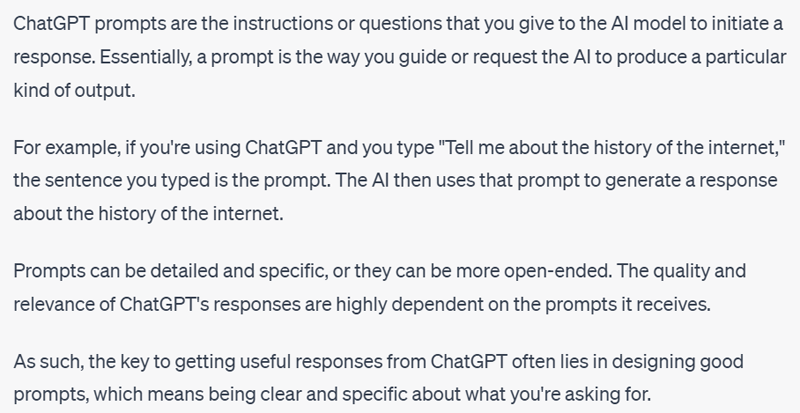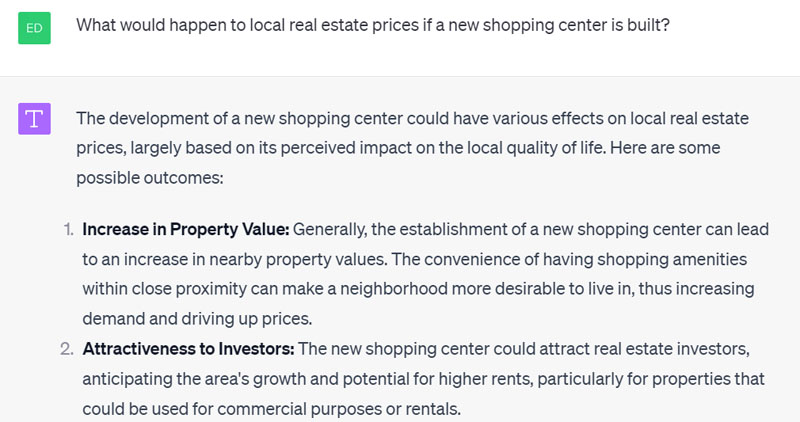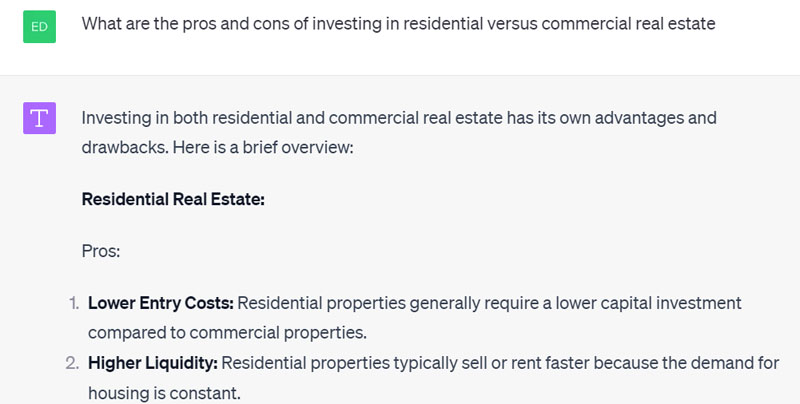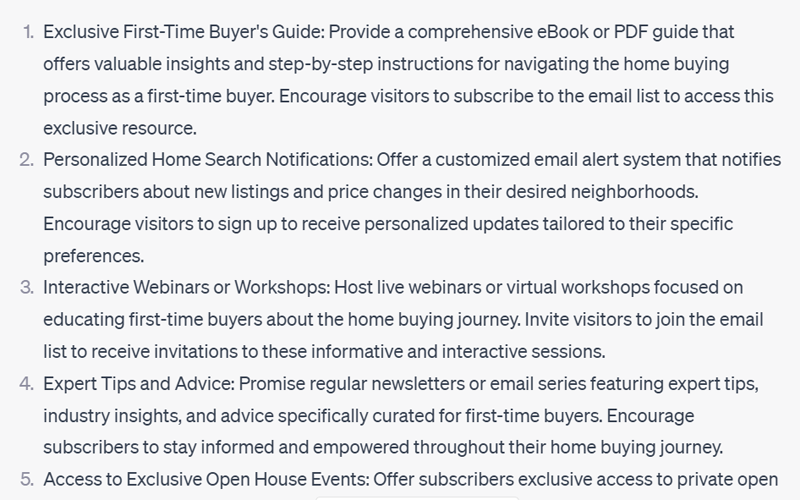Have you used ChatGPT as a Realtor, broker, or investor only to get disappointed by its subpar responses?
The issue may not lie with the AI model itself, but with the prompts you are putting into ChatGPT.
ChatGPT has huge potential to help real estate professionals and investors. Its usefulness, however, depends on the prompts you give it.
In this comprehensive guide, I will share some prompt strategies specifically tailored for the real estate industry. I have personally implemented these strategies to achieve great results for my clients.
Table of Contents
What are ChatGPT prompts?
A prompt is basically an instruction for the ChatGPT AI model to initiate an interaction with you. It’s the start of a digital dialogue and can take various forms.

The prompt could be:
- A question seeking a specific answer
- A statement to get a detailed response
- Even a hypothetical scenario to stir up creativity
These prompts have a variety of applications. You can:
- Generate unique ideas
- Start a conversation
- Get a fresh perspective or seek more information on a topic of interest
Keep in mind that the prompts can be tailored to match your individual preferences and areas of interest which allows for personalized and interactive exchanges.
8 types of ChatGPT prompts useful for Realtors and investors
To make the most of ChatGPT prompts, it’s important to understand the various kinds of prompts you might use.
Below are some of the most common types of prompts that you, as a real estate agent or investor, will likely find helpful.
This list doesn’t cover every type, but it’s a great place to start.
1. Factual or informational prompts:
If you are looking for clear-cut facts or details on a topic, you use factorial or informational prompts.
I would recommend avoiding these prompts at least for now because ChatGPT will give you incorrect answers in many cases. It is primarily due to the fact that it’s unable to provide real-time data or updates because the model includes information up to September 2021.

Here are some examples of factual or informational prompts:
For real estate agents:
- What are the licensing requirements for real estate agents in Texas
- What’s the best way to calculate the commission for a property sale
- What does escrow mean in real estate transactions
- How does the Fair Housing Act affect my responsibilities as a real estate agent
For real estate investors:
- What are the pros and cons of investing in multi-family properties
- How do I calculate capital gains tax on a property sale
- What are the implications of the 1031 exchange in real estate investment
- Explain the concept of cash flow in real estate investment
2. Creative writing prompts
These are widely used prompts. They basically write content for you on a topic requested.
Here are some examples of creative writing prompts:
For real estate agents:
- Write an enticing property description for a luxury penthouse in the city center.
- Write a compelling narrative for a quaint countryside cottage that tells its history.
- Create a catchy tagline for a newly renovated loft apartment in a bustling neighborhood.
- Develop a persuasive email to potential buyers highlighting the advantages of a particular property.
- Write a blog post about the top five features that sell homes in today’s market.
For real estate investors:
- Write a persuasive pitch to potential partners for a new real estate investment opportunity.
- Imagine you’re a tenant walking into your investment property for the first time. Describe the experience.
- Compose a compelling case study detailing a successful real estate investment you made.
- Create a narrative around the transformation of a distressed property into a high-value asset.
- Write an article discussing how emerging market trends could impact real estate investment strategies.
3. Advice or decision-making prompts
Are you facing a tough decision and want some guidance? Advice and decision-making prompts can be used in this situation.
For example, investing in commercial real estate can be a big step, and you’d want to weigh all the relevant factors before you take the plunge. In such a case, you could ask, “What factors should I consider when investing in commercial real estate?”
The response would help you consider all the important aspects, from location and market trends to property condition and potential return on investment.
If you’re a real estate agent looking to boost your productivity, effective time management can make a world of difference.
A prompt like, “How can I improve my time management skills as a real estate agent?” can provide you with practical strategies to manage your tasks more efficiently and maximize your productivity.
Here are some more examples of advice and decision-making prompts:

For real estate agents:
- What factors should I consider when pricing a property for sale?
- How can I improve my negotiation skills when dealing with home buyers?
- What’s the best way to expand my real estate network?
- How can I effectively use social media to generate more leads?
- What should I consider when choosing a real estate broker to work for?
For real estate investors:
- What are the key factors to consider when choosing a location for real estate investment?
- How can I effectively assess the risk of a real estate investment opportunity?
- What strategies can I use to increase my rental property income?
- How can I minimize my tax liability on rental income?
- What should I consider when deciding between investing in commercial or residential real estate?
4. Instructional prompts
These prompts come in handy when you need clear, step-by-step instructions to complete a task.
For instance, in today’s digital age, conducting a virtual home tour is a useful skill for realtors. But if you’re not sure how to go about it, a question like, “How do I conduct a virtual home tour?” can provide you with a detailed guide to carry out this task effectively.
Similarly, writing an engaging real estate listing can make a significant difference in attracting potential buyers. If you need help with this, you could prompt, “How do I write a compelling real estate listing?”

This would result in clear instructions on how to craft an enticing description that highlights the property’s best features and stands out in the marketplace.
Here are some examples of instructional prompts:
For real estate agents:
- How do I prepare a home for an open house?
- What’s the process of staging a home for sale?
- How can I write a compelling real estate listing?
- What steps should I follow to conduct a virtual home tour?
- How can I create an effective marketing plan for a property?
For real estate investors:
- How do I calculate the return on investment for a rental property?
- What’s the process of doing a 1031 exchange in real estate?
- How do I conduct due diligence before buying a property?
- How can I negotiate a lower price on a real estate deal?
- What steps should I take to evict a tenant legally?
5. Hypothetical scenarios
This is my favorite type of prompt. These prompts ask the AI to contemplate possible scenarios or situations.
For instance, the construction of a new shopping center could potentially impact local real estate prices.
To explore this possibility, you could ask, “What would happen to local real estate prices if a new shopping center is built?” The AI would then generate a response based on data and trends in real estate, offering a glimpse into possible outcomes.

Another example: For a whimsical and entertaining scenario, you might ask, “Describe a day in the life of a Victorian-era house.” This prompt allows the AI to provide a charming narrative from the house’s perspective, imagining the day-to-day events within its walls.
Here are some more examples of prompts that can be used for hypothetical scenarios:
For real estate agents:
- What would happen if a house inspection reveals significant structural issues right before the closing date?
- How would you handle a situation where a buyer backs out at the last minute?
- Imagine a scenario where the housing market crashes. How would you adjust your sales strategy?
- What would your approach be if a listed property is not getting any offers?
- How would you advise a client who wants to buy a house but has a low credit score?
For real estate investors:
- What would happen to my investment if a major employer leaves the city where my rental property is located?
- How would a rise in interest rates impact the profitability of my real estate investments?
- What if a long-term tenant decides to move out of my rental property unexpectedly?
- Imagine a scenario where new zoning laws prevent you from developing a property as planned. How would you handle it?
- How would an increase in property taxes impact the cash flow from my rental properties?
6. Role-play prompts
Another one of my favorite type of prompts! These invite the AI to adopt a specific role or persona. If you’re interested in the history of a well-known architectural style, such as mid-century modern design, you could instruct the AI, “You’re an architectural historian explaining the evolution of mid-century modern design.”
This prompt allows the AI to channel an architectural historian, giving you a detailed rundown of the style’s evolution and key features.
On a more playful note, you could also instruct, “You’re a ghost residing in an old mansion. Describe your home.” Here, the AI gets to imagine being a spectral inhabitant of an old mansion, providing a whimsically eerie description of the home from the ghost’s perspective.
Some more examples of role-play prompts:
For real estate agents:
- You’re a seasoned agent giving a new agent advice on handling difficult clients. What would you say?
- You’re an interior designer. Suggest decor upgrades that could improve the saleability of a home.
- You’re a home inspector explaining the top things you look for during a home inspection.
- You’re a successful agent sharing your top three secrets for closing a deal.
- You’re a real estate photographer. Provide tips for taking photos that will make a property stand out.
For real estate investors:
- You’re an experienced investor mentoring a newbie. Share the most important lessons you’ve learned.
- You’re a property manager explaining how you handle maintenance issues in a rental property.
- You’re a tax advisor giving advice on how to minimize taxes on rental income.
- You’re a city planner explaining how a proposed new development could impact local property values.
- You’re a real estate lawyer outlining the most important elements of a property purchase contract.
7. Opinion-based prompts:
If you need a data-based opinion on a specific topic from AI, you can use these prompts.
ChatGPT can certainly analyze data and provide varied perspectives based on existing information. If you’re considering different types of real estate investments and need a balanced comparison, you could ask, “What are the pros and cons of investing in residential versus commercial real estate?”

The AI would analyze data and trends to present a well-rounded view of both investment types. Similarly, the advent of technology has significantly impacted various industries, including real estate.
If you’re interested in exploring how something like virtual tours has influenced the industry, you could prompt, “Discuss the impact of virtual tours on the real estate industry.”
The AI would then provide an analysis based on available data and trends.
Here are some examples of opinion-based prompts:
For real estate agents:
- What are the advantages and disadvantages of working with first-time homebuyers?
- Discuss the impact of online home listings on traditional real estate marketing.
- How has the pandemic affected the way real estate agents do business?
- What are the pros and cons of working independently versus joining a real estate agency?
- Evaluate the effectiveness of open houses in today’s real estate market.
For real estate investors:
- What are the benefits and drawbacks of investing in residential versus commercial properties?
- Discuss the potential impact of rising interest rates on real estate investments.
- How does the location influence the success of a real estate investment?
- What are the advantages and challenges of owning rental properties?
- Analyze the potential effects of proposed housing policies on real estate investments.
For real estate agents:
- What are the advantages and disadvantages of working with first-time homebuyers?
- Discuss the impact of online home listings on traditional real estate marketing.
- How has the pandemic affected the way real estate agents do business?
- What are the pros and cons of working independently versus joining a real estate agency?
- Evaluate the effectiveness of open houses in today’s real estate market.
For real estate investors:
- What are the benefits and drawbacks of investing in residential versus commercial properties?
- Discuss the potential impact of rising interest rates on real estate investments.
- How does the location influence the success of a real estate investment?
- What are the advantages and challenges of owning rental properties?
- Analyze the potential effects of proposed housing policies on real estate investments.
8. Technical or complex prompts:
These prompts are great for when you need an in-depth explanation of complex or technical topics. Here are some examples:
For real estate agents:
- Explain the process and significance of a Comparative Market Analysis in real estate.
- Describe how the Multiple Listing Service (MLS) works and why it’s important for real estate agents.
- Explain the legal considerations for dual agency in real estate.
- Break down the steps of the home closing process.
- Describe the role of digital marketing in modern real estate and how it can be optimized.
For real estate investors:
- Explain how the capitalization rate (cap rate) is calculated and why it’s important for real estate investors.
- Describe the process of securing a commercial real estate loan.
- Explain the implications of the Fair Housing Act for real estate investors.
- Discuss how economic indicators can be used to analyze potential real estate investment opportunities.
- Explain the pros and cons of different real estate investment strategies, such as buy-and-hold, flipping, and wholesaling.
Best ways to use ChatGPT prompts for real estate
Now that you’ve learned about different types of prompts, let’s discuss how to use ChatGPT prompts for real estate effectively.
1. Designate a role to ChatGPT
If you want the best performance from ChatGPT, you should give it a distinct persona such as a specific professional role.
For example, you want ChatGPT to write a social media post for Facebook. You are a real estate agent that targets a specific community in a city with a focus on first-time home buyers.
You can use a prompt like:
Suppose you are a real estate agent in (community name) with a focus on first-time home buyers. These buyers are (describe a couple of specific characteristics such as age range, education level, etc.). You have created an eBook on first-time home buyer grants. Write a Facebook post in a language that resonates with these buyers with CTA being to check out the guide for more information
CTA refers to Call-to-Action in the above prompt.
Here is the result:

You will definitely need to edit a few words or sentences, but you can see how spot-on ChatGPT is in terms of interpreting the buyer persona.
Always try to specify the kind of tone you are looking for to get the best result.
2. Assign one task at a time
You must avoid overloading ChatGPT with multiple tasks at once. For example, if you’re a real estate agent looking for ChatGPT to create engaging newsletter content, you might want to craft a concise and specific prompt.
Suppose you want ChatGPT to outline a marketing campaign for a new property listing. You should include the target demographics, unique property features, and what actions you want potential clients to take.
Similarly, if you’re asking ChatGPT to generate ideas for growing your email subscriber list with a strong call to action, you might guide it along these lines:
“Pretend you’re a seasoned real estate marketing expert, and your client is a real estate agent specializing in properties for first-time buyers. Your objective is to grow a vibrant email list to achieve higher client engagement. The agent uses social media and newsletters to reach their audience. Provide detailed ideas for call-to-action items that the agent can offer.”
Here is the outcome:

3. Be specific and keep refining your prompts
Not happy with the output of a prompt you used to generate a response?
You should keep refining your inquiry based on the initial results.
Reshape your question, incorporate more specifics, or provide clearer context.
For example, if you’re requesting ChatGPT to “suggest a promising real estate market” and it’s too broad, modify it to something more detailed like:
“As an investor who appreciates markets with robust growth and strong rental yields, similar to Austin, Texas, can you suggest other real estate markets that might be of interest?”
4. Always provide a context in your prompts
Make sure your ChatGPT prompts should have a clear context, including historical data, user profiles, preferences, or any significant details, to accurately shape its response.
The more precise you can be, the better.
Instead of asking ChatGPT to “suggest profitable properties,” which might give you a generic output, use a better prompt.
You should clearly give ChatGPT details on
- Who you are
- What you do
- How your brand voice sounds
Since you would be using this information repeatedly, save it somewhere and paste it into ChatGPT at the start of every new dialogue.
For example, rather than instructing ChatGPT to “create a property marketing strategy,” the prompt should state:
“I am a leading [role] who assists [target audience] in realizing their real estate aspirations. Our brand voice is confident, trustworthy, empathetic, and informative. Develop a marketing strategy for me to expand my brand presence on Zillow and Realtor.com by leveraging my successful real estate blog.”
5. Break down prompts into steps
Your real estate prompts should be clear and have context, but avoid making them excessively lengthy prompt.
Instead, segment the expected outcome into a sequence of steps. You will be able to identify what aspect the chatbot may not comprehend.
If the objective is to employ ChatGPT to formulate a compelling property listing description, you can first prompt the chatbot to identify the key features and selling points that are most likely to appeal to potential buyers.
In a separate prompt, request it to incorporate these findings into the property description.
For example, as a real estate agent looking to sell a high-end residential property, you might break down your use of ChatGPT into the following steps:
- First prompt: “Based on current luxury real estate market trends, what are the key selling features that potential buyers are seeking in a high-end home?”
ChatGPT may provide an output such as: “Recent trends suggest that potential buyers in the luxury real estate market are looking for properties with ample outdoor space, state-of-the-art home automation, high-end kitchen appliances, spacious home offices, and wellness-oriented features like home gyms or saunas.”
- Second prompt: “Given that the property I’m selling has a spacious backyard, smart home features, a gourmet kitchen, a large home office, and a personal gym, how can I incorporate these features into a compelling property listing?”
The AI might then generate a listing description along the lines of: “Experience the epitome of luxury living in this elegantly appointed residence. Boasting a sprawling backyard, cutting-edge home automation for your comfort, a gourmet kitchen for culinary explorations, a generously proportioned office for your work-from-home needs, and a private gym for your wellness journey, this home offers a coveted lifestyle like no other.”
This step-by-step approach enables the user to guide ChatGPT in generating more tailored outputs while allowing room for adjustments based on the AI’s understanding of the prompts.
6. Ask ChatGPT how to write better prompts
This one is my favorite trick. If I am not sure what prompt I should use or the one I am using is not good enough, I ask ChatGPT what other details it needs from me to produce the best output.
I would add a line to your prompt that follows this template: “If I want to [desired outcome], what prompts should I share with ChatGPT in order to get the best results?”
Once ChatGPT has generated an output, tell the chatbot what you like and dislike about the output and ask it to request additional results, edits, or tweaks.
7. Use clear prompts based on your intent (don’t be lazy)
Instead of the prompt “compare and contrast investing in commercial real estate versus residential real estate,” it should be refined to:
“Can you compare and contrast the advantages and disadvantages of investing in commercial real estate versus residential real estate for long-term wealth building?”
You can also consider using a synonym dictionary if you are not sure if the word you are using is the correct one or if you are looking for a better verb to clarify your intent.
8. Praise the ChatGPT first
You will get the best results if you interact with the AI in polite, straightforward language – much like when you are addressing a friend.
For example, when seeking advice from ChatGPT regarding how real estate agents can improve their negotiating skills, you can begin by giving complimentary remarks such as:
“You’re excellent at understanding the key aspects of a real estate agent’s difficulties in negotiating with sellers.”
After the chatbot delivers a response you appreciate, convey your gratitude by saying something along the lines of, “This is wonderful. Thank you very much!” followed by a request for modifications to its output.
9. Ask ChatGPT to adjust the tone and reading level
If you’re utilizing ChatGPT to create property descriptions or captions for social media posts, ensure you adjust its tone so the content appeals to your intended audience.
For social media and other types of online content, a fifth or sixth-grade reading level will resonate better with your audience in most cases.
To achieve this, Couto recommends instructing ChatGPT to “alter the reading level and tone” after it delivers a response. For example, after generating a property description, you might say:
“This is a great description, but can you simplify it a bit and give it a more conversational tone so it appeals to a wider audience?
10. Give ChatGPT an outline
You will have better control over the output if you provide ChatGPT with an outline, particularly if you want it to write long-form content such as a blog post.
“Adhere to this analysis structure — 1. Introduction to the market, 2. Discuss current trends and challenges, 3. Present potential solutions or strategies for investors, 4. Conclude with key takeaways — craft a 1,000-word market analysis at a sixth-grade reading level in the third person using the provided data.”
This holds the key to using ChatGPT for creating unique content.
In conclusion
If you master the art of how to assign ChatGPT a specific role, how to break down tasks into simple steps, and how to use clear and specific prompts, you will be able to leverage the massive potential of this revolutionary AI model.
So, don’t get discouraged if your first few attempts aren’t perfect. Keep trying, keep refining, and soon you’ll be a pro at using ChatGPT to make your real estate work easier and more effective. Good luck!
![ChatGPT Prompts for Real Estate: A Comprehensive Guide [100+ Examples]](https://realtycrux.com/wp-content/uploads/2023/07/chatgpt-prompts-for-real-estate.jpg)





![2 Best Platforms to Hire Real Estate Virtual Assistant for Realtors & Investors [2023 Update]](https://realtycrux.com/wp-content/uploads/2023/02/fiverr-vs-upwork-real-estate-virtual-assistant-xxlx2kx2-300x144.jpg)